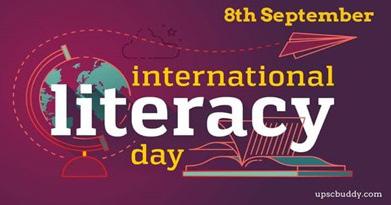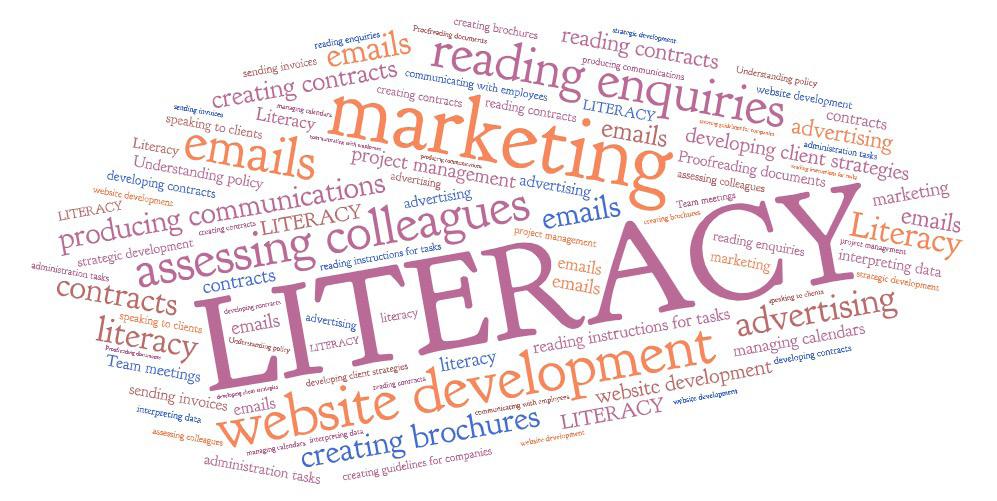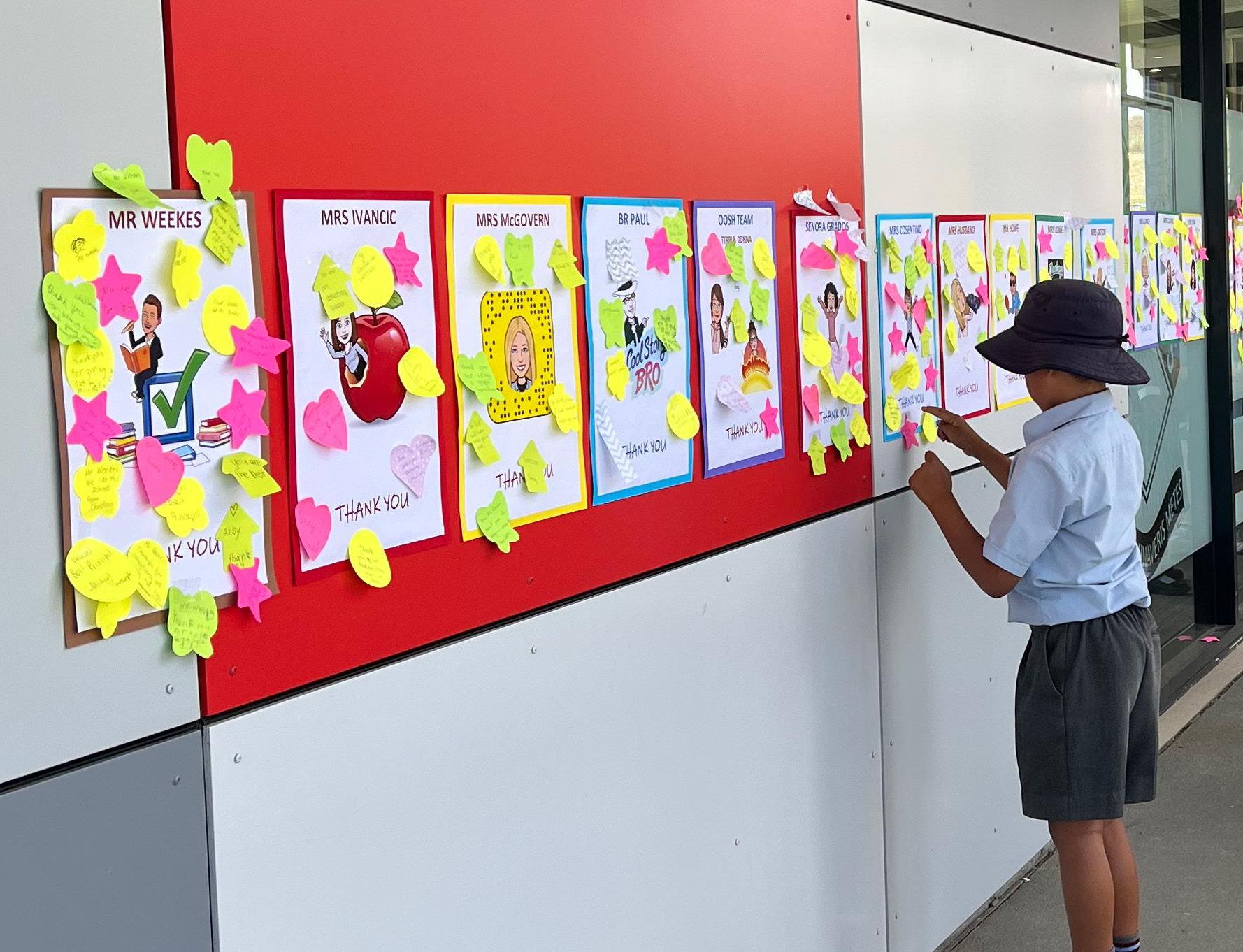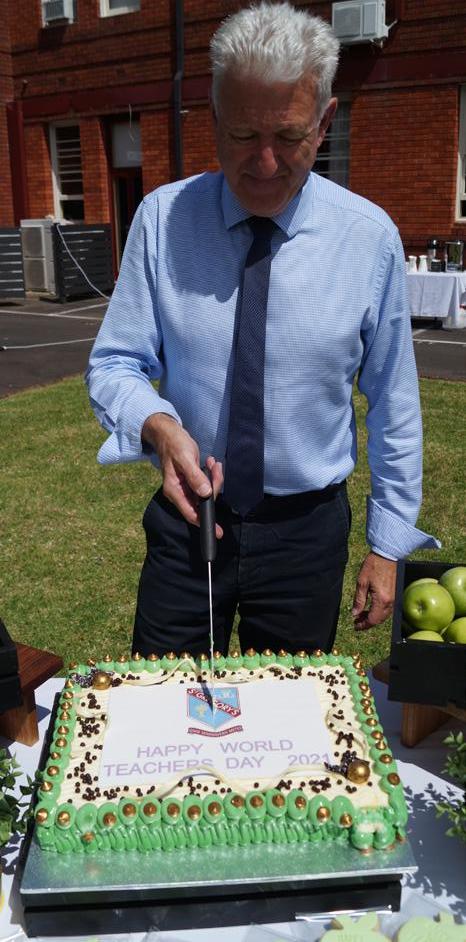
7 minute read
CAPITAL PROJECTS
INTERNATIONAL LITERACY Day
International Literacy Day
Advertisement
Ms Judith Tolomeo - Director of Teaching & Learning
This year’s theme for International Literacy Day was “Literacy for a humancentred recovery: Narrowing the digital divide”. The theme of ILD 2021 is set to create more awareness among people regarding digital literacy.
The teachers and students adapted to the online environment using different approaches to inquiring, collaborating, researching and presenting.
International Literacy Day takes place on 8 September every year to raise awareness and concern for literacy problems that exist within our own local communities as well as globally. International Literacy Day was founded by proclamation of The United Nations Educational, Scientific and Cultural Organization, or UNESCO, in 1966 “to remind the public of the importance of literacy as a matter of dignity and human rights.” International Literacy Day brings ownership of the challenges of illiteracy back home to local communities where literacy begins, one person at a time.
Although much progress has been made in improving literacy rates in the more than fifty years since the first International Literacy Day, illiteracy remains a global problem. There are thought to be more than 750 million adults around the world who cannot read.
What exactly is literacy?
Literacy can be defined as “the quality or state of being literate: educated…able to read and write.”
Because you can read this and no doubt spend a lot of time reading online, it may seem incredulous to learn there are people living and working in your own community who not only cannot read this, but are unable to read a book, arestaurant menu, a road sign, a voting ballot, an instruction manual, a prescription bottle label, or a cereal box.

Can you imagine navigating modern-day life without the basic ability to read and write? Wiping out illiteracy in every local community around the world is what International Literacy Day is all about.
Studies show that giving the brain a daily workout reading, writing, and working with numbers keeps brain cells healthy as we age, reducing the chances of developing Alzheimer’s and dementia later in life. The lack of literary skills limits social engagement at all age levels and prevents adults and children from being able to participate fully and contribute to the betterment of society. Learning to read and write improves our ability to communicate effectively with others by enhancing oral language, allowing us to express our feelings, thoughts, and ideas with others more clearly. Knowing how to

read, write and work with numbers are critical skills for jobs with opportunities to advance up the social-economic ladder. Literacy breaks the cycle of poverty, one life at a time.
The College acknowledged the importance of International Literacy Day with all students engaging in activities. The Mathematics department recognised that 50% of errors in Mathematics occurs prior to doing any calculations due to not understanding what the question is asking. PDHPE students focused on cause-and-effect language and the use of verbs. Students have been looking at text types in Agriculture, whilst Year 8 Italian engaged in literacy as part of their assessment task, creating an eBook about an Italian family. Students focused on using adjectives in English and Italian to construct several family member descriptions. Years 9 and 10 Computing students completed written activities with a focus on verbs, adjectives, punctuation and cause and effect paragraphs. They also reviewed topic vocabulary by playing online spelling games through the Educandy website. Science classes celebrated International Literacy Day by reading articles from scientific journals. The boys wrote a response, addressing key points in the article, scientific ideas presented, and what they learnt from reading the article.
Our Community Engagement Team ensured parents of the College became involved too. A call-out was made to Senior & Junior parents to share the books they were reading, the importance of reading and share their areas of employment where literacy is very important. A video was pulled together of parents sharing their favourite books and why they love it.
All areas of employment were collected and a word cloud was made (above).
JUNIOR & SENIOR School
World Teachers’ Day
Ms Judith Tolomeo - Director of Teaching & Learning
World Teachers’ Day was celebrated across NSW on Friday 29 October, with Minister for Education and Early
Childhood Learning Sarah Mitchell encouraging the community to let the State’s 160,000 teachers know how important they are.
This year, despite major challenges, our College staff made sure quality education continued for the students at St Gregory’s. It has reinforced the significant role that teachers play in the lives of children and students, their families and communities.
World Teachers’ Day was an opportunity for staff to celebrate and be proud, and the College was excited to share this day with all staff and students. The College held an impressive morning tea to say “Thank you” to all staff for all they do every day. The gathering was held outdoors in front of the
College Grotto overlooking the vast College grounds for the Senior School staff and onsite in the Junior School. Two of the Colleges’ longest serving staff members; Mr Peter Hogan and Mr Greg Serrone, had the honours of cutting the “WTD” cake at the Senior School celebration. The College’s Leader of Learning, Mr Don Perna, captured a great aerial shot of all Senior Staff during the morning tea celebrations with the drone.



The College Leadership Team wrote personal messages of thanks to all staff, which accompanied a World Teachers’ Day cookie, in the shape of an apple. Throughout the day, students wrote “Thank you” messages to staff in appreciation for their dedication and ongoing support. Throughout the week, staff uploaded to the College social page, their response to “How does Teaching have a bright future”. I am sure we all agree, that with the fabulous staff we are blessed with at St Gregory’s, that teaching does have a “bright future”.


YEAR Nine
The Rite Journey
Mr Daniel Goodhew - Year 9 Leader

The Year 9 Pastoral Program at St Gregory’s College has undergone major transformation throughout 2021. Year 9 2021 sees the first year that the College implemented a new year-long program called ‘The Rite Journey’ (TRJ). The program is delivered by our Homeroom Teachers who have been specifically trained for the Rite Journey program and is delivered during Year 9’s Pastoral Care lessons.
What is ‘The Rite Journey’?
Most traditional cultures have a carefully crafted process guided by elders that provide this growth and development. However, in western society, this tradition has been lost and we see that adolescents often take it upon themselves to create their own rites of passage which often are not healthy and do not contribute to any real growth.
There are significant challenges that young people are faced with today; the dominance of media, changing nature of family structures; the 24/7 access to information (which is not always accurate); unfiltered content and instant gratification of a world where we carry the internet in our pockets - all this takes a toll on society as a whole and, there is a price to pay. Unfortunately, the added pressures flow onto families and we are aware of the impact these have on raising and relating to adolescents. Learning to be an adult; male or female in any society, involves guidance, mentoring and a great many conversations with trusted and reliable elders (parents, mentors, teachers etc.). However, these days we see young people turn to peers or the media for such guidance and this has resulted in a loss of human connection as screens dominate our adolescents’ lives.
The College Leadership Team sees the importance that we as a College community play in guiding the young men in our care on their journey during the TRJ program, however, we know that the extremely important relationships in a young person’s life are fostered at home and within their community.
A unique feature of ‘The Rite Journey’ (TRJ) is the seven steps that form a contemporary Rite of Passage. The Rite Journey team here at the College, have created a special and memorable series of events, aimed at












